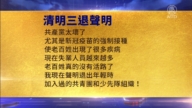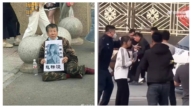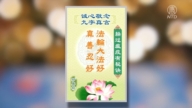【新唐人2012年6月9日讯】在大陆,不断传出中共官员和文艺界明星的“桃色新闻”,最近“中国时尚民歌天后”——汤灿,因涉嫌贪污被判15年,据传,汤灿是前重庆市委书记薄熙来和中共政法委书记周永康两人的“共用情妇”,一时间,民歌手与公权力的关系成为当下热门的话题。
大陆最大门户网站之一的《腾讯》,6月8号发表有关“民歌天后跟公权力关系”的文章。文章以“民歌天后汤灿”被绯闻缠身,并以她被判15年刑期的流言作为引子,带出中国社会民歌手跟公权力关系的深层社会问题,及民歌艺术的堕落。
文章认为,中国的民歌并非民族歌曲,而是种官方文艺,也叫爱国歌曲。民歌市场竞争力不足,主要靠体制支撑。
文章说,官方文艺演出撑起了民歌手的一片天,著名民歌手即便早就没有生存发展问题,也要保留或谋求一个体制内编制、特别是部队编制。文章不点名批评每年都上春晚独唱的民歌手宋祖英,指称她靠官方文艺演出,才有发展空间。
文化评论人叶匡政表示,目前的中国社会,还是政治主导整个文艺市场。
叶匡政:“无论是央视还是地方电视台,几乎除了少数民间一些小剧场以外,中国的这种文化和娱乐基本上是控制在中共的权力体系之下的。”
宋祖英本来是湘西苗家一个普通贫户女子,一个偶然的机会被挑选上“中央民族学院”音乐舞蹈系。1991年,她在《央视》春晚节目上被前中共总书记江泽民相中,之后就成为江泽民情妇中最受关注的一个。1966年出生的宋祖英,比江泽民整整小40岁。
据传,江泽民让宋祖英和丈夫离婚,并让她拥有特殊的通行证——“红卡”,可以自由出入中南海。
外传1997年一天,一位借调到北京的女歌手乘坐宋祖英的车,一同去中央台录音棚录小样,在车上这位女歌手无意中打开工具箱,赫然发现一张“中南海红卡”,不久此事就传遍“总政歌舞团”,那位女歌手随后被所在单位遣回原籍天津。有消息说,回天津不久后,她就被人从阳台推下楼灭了口。
而江泽民为了让宋祖英高兴,没少花国库的巨款。宋祖英要到澳大利亚悉尼开个人演唱会,江泽民马上拨款数千万人民币给海军,让宋祖英在澳大利亚和奥地利扬名。江泽民还曾经花千万元给宋祖英出首张精选DVD光碟,2002年中国新年前夕在全国上市。
叶匡政:“主角永远是那些为权力唱赞歌或者为艺术形态背书的这样一些歌星,所以让那些歌星跟权力有这种关联,我觉得是一个非常正常的事情,在北京是一个普遍现象。”
叶匡政指出,中共为了维持极权体制,把中国的大型晚会或者文艺节目都改造成洗脑的工具,变成了为政府歌功颂德的一种仪式。叶匡政说,依靠权力和中共体制的歌星,她暂时的位置虽然仍然稳定,
而一旦背后的权力出现问题,就会波及到她。
采访编辑/唐睿 后制/钟元
Folk Singer And Public Power
In China, reports of affairs of Chinese Communist Party (CCP)
officials and show business people emerged again and again.
Recently Tang Can, queen of popular folk songs in China,
was sentenced to 15 years on suspicion of corruption.
Tang Can was reported to be a ‘shared mistress’ of Bo Xilai,
the former Chongqing Party Secretary and Zhou Yongkang,
CCP Politics and Law Committee secretary. Affairs between
folk singers and powerful officials became a current hot topic.
Chinese portal Tencent, published an Article on June 8th
called Folk Song Queen and Public Power Relationships.
With scandals of folk song queen Tang Can and
her 15-year sentence,
the article brought out deep social problems of the social
folk singers and public power relationships, and the folk art degeneration.
The article said that Chinese folk songs are not folk songs
any more but an official art, also known as patriotic songs.
They lack market competitiveness, and depend mainly on
institutional support.
The article says that the official theatrical performances
opened the market for folk song singers.
As a famous folk singer, one would retain or seek a position
within the CCP system, especially in the military, even if there is no survival or development issue.
It criticized without naming Song Zuying, saying that she relied
on official art performances to obtain space for development.
Ye Kuangzheng, a cultural critic, said that in current Chinese
society, the arts market is still dominated by politics.
Ye Kuangzheng: “Whether CCTV or local TV stations,
other than some small civil theaters,
culture and entertainment in China are mainly
controlled by the power system of the CCP."
Song Zuying was originally a poor woman with Miao
nationality in western Hunan Province.
She was chosen by the music and dance department in the
Central Institute for Nationalities.
In 1991, former CCP General Secretary Jiang Zemin fell in love
with her in her program on the Spring Festival Gala on CCTV.
Later, Song attracted the most attention as a mistress of Jiang.
Song was born in 1966, and is 40 years younger than Jiang.
It is reported Jiang Zemin asked Song Zuying to get divorced,
and let her have a special pass, (Red Card) for free access to Zhongnanhai.
It is said in 1997, a temporary singer went to the CCTV studio
to record a demo together with Song Zuying in Song’s car.
In the car, the signer accidentally opened the glove box in the
car and unexpectedly saw a Red Card of Zhongnanhai.
This soon spread throughout the Song and Dance Ensemble
of the General Political Department.
The singer was subsequently sent back to her hometown
Tianjin.
It is said that shortly after her return she was pushed over the
balcony of her building and died.
Jiang Zemin frequently appropriated large sums of money in
the treasury to please Song Zuying.
Song Zuying wanted to hold an individual performance in
Sydney, Australia.
Jiang Zemin immediately allocated tens of millions of yuan to
the Navy, helping Song Zuying to gain distinction in Australia and Austria.
Jiang spent 10 million yuan for her first selection of DVDs.
These went on sale across China before 2002 Chinese New Year’s Eve.
Ye Kuangzheng: “The leading roles are always those singing
the praises for power, or endorsing certain art forms.
It is very normal to let those singers be associated with power.
It is a common phenomenon in Beijing."
Ye Kuangzheng pointed out that in order to maintain the
totalitarian regime, the CCP has made all big performances
and theatrical items a brainwashing tool,
and a ceremony of the communist regime.
Ye Kuanzheng said that singers relying on power and
the CCP regime are only stable on a temporary basis;
Once the power behind the CCP runs into problems,
they will be implicated.


























